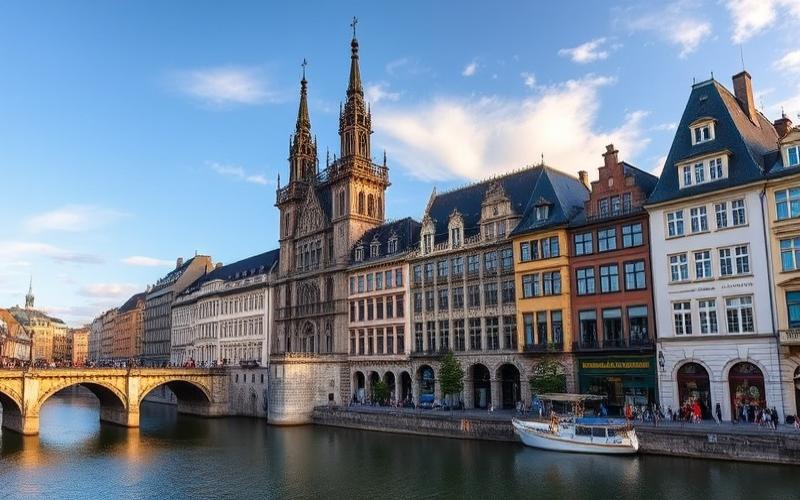
 Published on and written by Cyril Jarnias
Published on and written by Cyril Jarnias
Luxembourg, a small country at the heart of Europe, attracts numerous foreign investors thanks to its economic and political stability, high quality of life, and dynamic real estate market. However, the property purchase process for non-residents may seem complex at first glance. This article will guide you through the key steps and specificities of acquiring property in the Grand Duchy.
A Market Open to Foreign Investors
Good news for international buyers: Luxembourg imposes no specific restrictions on foreigners wishing to acquire property within its territory. Whether you’re a resident of the European Union or a third country, you enjoy the same rights as Luxembourg citizens regarding property purchase. This market openness reflects the country’s desire to attract foreign investment and promote diversity within its population.
However, it’s important to note that some municipalities may have specific rules concerning primary residence. For example, some municipalities require the buyer to commit to occupying the property as their primary residence for a determined period. These restrictions aim to limit real estate speculation and preserve housing access for local residents.
The Luxembourg real estate market is known for its high prices, particularly in the capital and its surroundings. This situation is explained by high demand, scarcity of buildable land, and the country’s economic attractiveness. Foreign investors must therefore be prepared to face significant acquisition costs but can also expect good long-term property appreciation.
Good to know:
Although the market is open to foreigners, it’s highly recommended to work with local professionals (real estate agent, notary, lawyer) to navigate the purchase process effectively and avoid potential pitfalls.
The Legal Framework of Property Purchase: What You Need to Know
The property purchase process in Luxembourg is governed by a strict legal framework, aiming to protect both buyers and sellers. Here are the main steps and regulations to know:
1. The Sales Agreement
The first formal step of the purchase process is signing the sales agreement. This document, although often considered a mere formality, has significant legal value in Luxembourg. Once signed by both parties, it legally binds the buyer and seller. It’s therefore crucial to have it reviewed by a professional before signing.
- The precise identity of the parties
- The detailed description of the property
- The sale price and payment terms
- The suspensive conditions (for example, obtaining a bank loan)
- The deadline for signing the notarized deed
2. The Withdrawal Period
A particularity of Luxembourg law is the 10-day withdrawal period granted to the buyer after signing the sales agreement. During this period, the buyer can withdraw without having to provide justification and without penalty. This period offers additional protection to buyers, allowing them to calmly reconsider their commitment.
3. The Notarized Deed
The sale is definitively concluded when signing the authentic deed before a notary. In Luxembourg, using a notary is mandatory for all real estate transactions. The notary plays a central role in the process, verifying the legality of the transaction, ensuring all conditions are met, and proceeding with the registration of the sale with the competent authorities.
4. Preliminary Checks
- Verification of ownership origin
- Check for absence of mortgages or easements
- Verification of property compliance with urban planning rules
- Check of the property’s tax situation
These checks are essential to guarantee the legal security of the transaction and avoid unpleasant surprises after the purchase.
Good to know:
The notary has a duty to advise all parties. Don’t hesitate to ask all your questions, even if you’re a foreigner and unfamiliar with the Luxembourg system.
Real Estate Taxation for Foreign Buyers: What to Expect
Real estate taxation in Luxembourg involves several aspects that foreign buyers must consider in their acquisition project. Although the country is known for its advantageous taxation in some areas, real estate is subject to certain taxes and duties.
1. Acquisition Costs
- Registration duties: 6%
- Transcription duties: 1%
- Notary fees: variable, but generally around 1% to 1.5% of the purchase price
It’s important to note that these costs are the buyer’s responsibility and must be added to the purchase price when calculating the total budget.
2. Property Tax
As in many countries, property owners in Luxembourg are subject to an annual property tax. The amount of this tax varies depending on the municipality where the property is located and its characteristics (surface area, type of property, etc.). Although generally moderate compared to other European countries, this tax must be considered when calculating recurring property-related costs.
3. Real Estate Capital Gains Tax
- Less than 2 years: the capital gain is taxed at the seller’s marginal tax rate (can go up to 42%)
- More than 2 years: a fixed rate of 20% is applied
However, there are reductions and exemptions, particularly for the seller’s primary residence.
4. VAT on New Properties
The purchase of a new property is subject to VAT at the rate of 17%. However, there is a reduced VAT regime at 3% for the acquisition of a primary residence, within the limit of a cap of €50,000 of VAT per dwelling. This measure aims to promote homeownership for residents.
5. Taxation of Rental Income
For foreign investors considering renting out their property, it’s important to know that rental income is taxable in Luxembourg. The tax rate depends on the owner’s overall income and can reach 42% for the highest brackets. Deductions are possible for property-related expenses (loan interest, renovations, etc.).
Good to know:
Luxembourg has concluded numerous international tax agreements aimed at avoiding double taxation. It’s recommended to consult a tax expert to optimize your situation, especially if you reside in another country.
Essential Documents to Finalize Your Purchase
To successfully complete your real estate acquisition project in Luxembourg as a foreigner, you’ll need to gather a number of documents. Careful preparation of this file is crucial to avoid any delays or complications in the purchase process.
1. Identity Documents
- Valid passport or identity card
- For non-EU nationals: valid residence permit or visa
2. Financial Documents
- Proof of income (pay stubs, tax notices)
- Bank statements from recent months
- Proof of equity
- Loan pre-approval (if financing through a loan)
3. Property-Related Documents
- Seller’s title deed
- Energy performance certificate
- Property plans
- Technical diagnostics (asbestos, lead, etc.)
- Condominium regulations (for apartments)
4. Administrative Documents
- Residence certificate (if you’re already a resident in Luxembourg)
- Luxembourg tax identification number (to be obtained from the Direct Tax Administration)
5. Specific Documents for Legal Entities
- Company statutes
- Extract from the trade register
- Power of attorney for the signing person
It’s important to note that some documents will need to be translated into French, German, or Luxembourgish by a sworn translator if they’re in another language. Additionally, some foreign documents might require an apostille or legalization to be recognized in Luxembourg.
Good to know:
The notary handling the transaction will provide you with a precise list of required documents. Don’t hesitate to contact them in advance to save time in preparing your file.
Key Steps of Your Real Estate Acquisition in Luxembourg
To help you visualize the purchase process as a whole, here’s a summary of the main steps to follow to acquire property in Luxembourg as a foreigner:
- Define your criteria (budget, location, property type)
- Check online listings and contact real estate agencies
- Visit properties that interest you
- Make a written purchase offer to the seller
- Negotiate the price and sale conditions
- Obtain loan pre-approval if necessary
- Compare offers from different banks
- Have the sales agreement reviewed by a professional
- Sign the sales agreement and pay the deposit (generally 10% of the price)
- Take advantage of the 10-day withdrawal period
- Finalize your financing file
- Provide all required documents to the notary
- The notary performs necessary checks
- Sign the sales deed at the notary’s office
- Pay the balance of the price and acquisition costs
- The notary registers the sale with the authorities
- You receive the keys and officially become the owner
Throughout this process, don’t hesitate to be accompanied by local professionals (real estate agent, notary, lawyer) who know the specificities of the Luxembourg market and can guide you effectively.
Good to know:
The average time between signing the sales agreement and signing the authentic deed is generally 2 to 3 months in Luxembourg. This timeframe can vary depending on the transaction’s complexity and the time needed to obtain financing.
In conclusion, buying property in Luxembourg as a foreigner is entirely possible and can represent an excellent investment. Although the process may seem complex at first, good preparation and professional support will allow you to complete your project under the best conditions.
The Luxembourg real estate market, characterized by its stability and appreciation potential, offers great opportunities to foreign investors. However, it’s essential to understand the local specificities, both in terms of regulations and taxation, to make an informed choice and secure your investment.
Remember that each situation is unique. Therefore, don’t hesitate to consult local experts to obtain personalized advice tailored to your profile and objectives.
Disclaimer: The information provided on this website is for informational purposes only and does not constitute financial, legal, or professional advice. We encourage you to consult qualified experts before making any investment, real estate, or expatriation decisions. Although we strive to maintain up-to-date and accurate information, we do not guarantee the completeness, accuracy, or timeliness of the proposed content. As investment and expatriation involve risks, we disclaim any liability for potential losses or damages arising from the use of this site. Your use of this site confirms your acceptance of these terms and your understanding of the associated risks.
















































